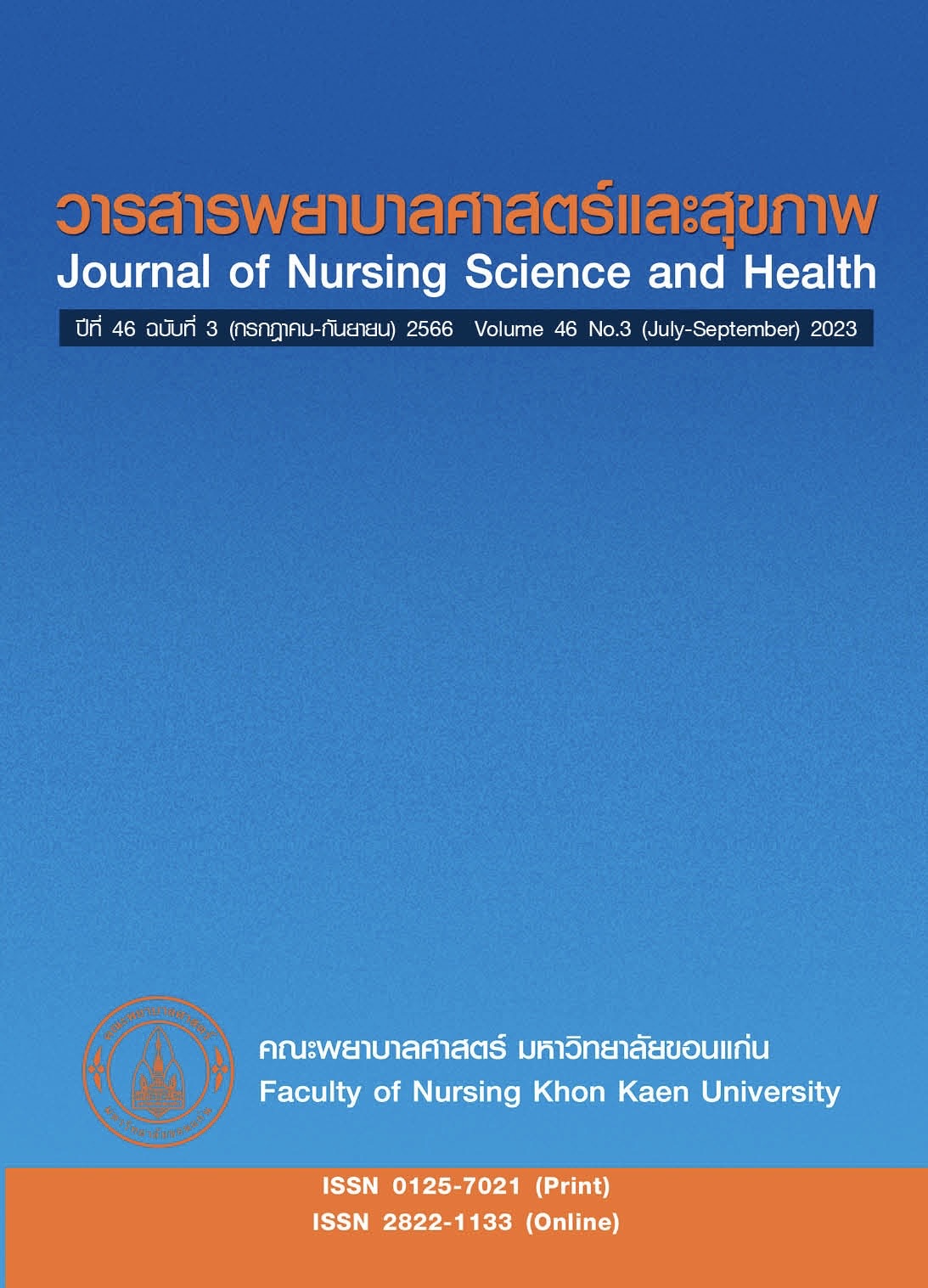การพัฒนารูปแบบการพยาบาลเพื่อส่งเสริมการควบคุมระดับน้ำตาลในผู้ป่วยเบาหวาน ประเภทที่ 2 ในหน่วยบริการปฐมภูมิ อำเภอเมือง จังหวัดมหาสารคาม
คำสำคัญ:
การจัดการสุขภาพตนเอง, ผู้ป่วยเบาหวาน ชนิดที่ 2, หน่วยบริการปฐมภูมิบทคัดย่อ
การวิจัยเชิงปฏิบัติการพัฒนารูปแบบการพยาบาลเพื่อส่งเสริมการควบคุมระดับน้ำตาลในเลือดของผู้ป่วยโรคเบาหวานประเภทที่ 2 ในหน่วยบริการปฐมภูมิ โดยใช้แนวคิดการจัดการสุขภาพตนเอง พื้นที่ศึกษา คือ หน่วยบริการปฐมภูมิ 4 แห่ง ในอำเภอเมือง จังหวัดมหาสารคาม ผู้ร่วมวิจัย คือ ผู้ป่วยเบาหวานชนิดที่ 2 ที่มีระดับน้ำตาลเฉลี่ยสะสมในเลือด มากกว่า 9 มก.% จำนวน 61 คน การวิจัยแบ่งเป็น 3 ระยะ คือ 1) ระยะเตรียมการ 2) ระยะพัฒนารูปแบบ และ 3) ระยะประเมินผล ดำเนินการวิจัยระหว่าง เดือน กรกฎาคม 2565 - กุมภาพันธ์ 2566 เก็บรวบรวมข้อมูลจากเวชระเบียนหน่วยบริการปฐมภูมิ และฐานข้อมูลจากกระทรวงสาธารณสุข เครื่องมือที่ใช้ในการวิจัย ได้แก่ แบบสอบถาม และบันทึกการสนทนากลุ่ม วิเคราะห์ข้อมูลโดยใช้สถิติเชิงพรรณนาด้วย ร้อยละ ค่าเฉลี่ย ส่วนเบี่ยงเบนมาตรฐาน และวิเคราะห์เชิงเนื้อหา
ผลการศึกษาพบว่า รูปแบบการพยาบาลในการส่งเสริมการจัดการสุขภาพตนเองของผู้ป่วยเบาหวานประเภทที่ 2 ประกอบด้วย 8 กิจกรรม คือ 1.สำรวจข้อมูล วิเคราะห์สถานการณ์และค้นหาปัญหาผู้ป่วยรายพื้นที่ 2.ประชุมปรึกษาคณะทำงานเพื่อคัดเลือกพื้นที่และหาแนวทางแก้ไขปัญหา 3.จัดตั้งคลินิกเบาใจ ไตดี รวมทั้งจัดกิจกรรมให้คำปรึกษาและตั้งเป้าหมาย 4.เฝ้าระวังการดูแลตนเองของผู้ป่วยโดยใช้สมุดประจำตัว 5.เยี่ยมบ้านติดตามดูแลตนเองของผู้ป่วยและญาติ 6.นัดติดตามผลการดูแลจากภาวะสุขภาพและพฤติกรรมสุขภาพของผู้ป่วย 7.ประเมินและสรุปผลการดูแลตนเอง สรุปผลการดำเนินงาน และ 8.ถอดบทเรียนและแก้ไขปรับปรุงภายหลังการนำรูปแบบการพยาบาลที่พัฒนาไปทดลองใช้ พบว่า กลุ่มตัวอย่างส่วนใหญ่ (จำนวน 44 คน คิดเป็นร้อยละ 72.13) มีค่าคะแนนด้านปัจจัยความรู้เกี่ยวกับโรคเบาหวานอยู่ในระดับมาก การรับรู้ภาวะสุขภาพอยู่ในระดับปานกลาง (M=4.02, SD=0.15) และพฤติกรรมการดูแลตนเองอยู่ในระดับปานกลาง (M=3.64, SD=1.44) นอกจากนี้ ยังพบว่าส่วนใหญ่ (จำนวน 42 คน คิดเป็นร้อยละ 68.85) มีค่าน้ำตาลเฉลี่ยสะสมในเลือดลดลง
เอกสารอ้างอิง
Non-communicable diseases (NCDs) groups. Department of disease control. Non communicable disease report. Nonthaburi: Ministryof Public Health; 2018.
Ministry of Public Health. Health Data Center (HDC). Reports data to respond non communicable disease of service plan. [Internet]. Nonthaburi: HDC; 2022 [cited 2022 Jan 10]. Available from: http://Hdcservice.moph.go.th/hdc/reports (in Thai)
Teemueangsai W. Development of nursing care that supports self care in type 2 diabetes patients with hyperglycemia model of non-communicable disease in primary care units of Mueng, Maha Sarakham. Journal of Maha Sarakham hospital 2018;15(2):194-205. (in Thai)
Wattana C. Self-management support: Strategies for promoting disease control. Phrapokklao Nursing College Chanthaburi 2015;26(1):117-27. (in Thai)
Satiraugoon T, Leelawong S, Boonkaew H, Niamsri P. Model of nursing care that supports patients self care. [Internet] Bangkok: Thep Phen Vanish Publishing; First edition; 2021 [cited 2023 Mar 20]. Available from: http://www.don.go.th
Kemmis S, McTaggart, R. The action research reader. 3th ed. Victoria: Deakin University Press; 1990.
Klangphahol K, Mixed methods research. Journal of graduate studies Valaya Alongkorn Rajabhat University.2020 ;14(1):235-56. (in Thai)
Wandao Y, Chinnawong T, Chalothorn U, Tipwong A, the experience of self-management in patients with uncontrolled type 2 diahetes Sadao hospital Sadao Songkhla. Songklanagarind Journal of Nursing.2018;38(3):52-64. (in Thai)
Krejcie RV, Morgan DW. Determining sample size for research activities. Psycholological measurement 1970:607-10.
Krongthong S, Surason N. Development of nursing care in diabetes patients of Surin Hospital. Medical Journal of Srisaket Surin Buriram Hospitals 2017;32(1):43-53. (in Thai)
Chaimongkol S. Effects of self management program in patients with type 2 diabetes, Khon San, Chaiyaphum. Regional Health Promotion Center 9 Journal 2021;15(31):237-49. (in Thai)
Sanbudda T, Luenam S, Lardnongkhun S, Dana K. The effects of self-management program on glycemic control in patients with type 2 diabetes: COVID-19 Relief Measures. AJHE 2023:1(1):1-14. (in Thai)
Pintana Y, Kiteerawutiwong N, Effects of the self-management program on self management behaviors among type 2 diabetes mellitus patients. Journal of Nursing and Health sciences 2018;12(1):72-83. (in Thai)
ดาวน์โหลด
เผยแพร่แล้ว
รูปแบบการอ้างอิง
ฉบับ
ประเภทบทความ
สัญญาอนุญาต
ลิขสิทธิ์ (c) 2023 วารสารพยาบาลศาสตร์และสุขภาพ

อนุญาตภายใต้เงื่อนไข Creative Commons Attribution-NonCommercial-NoDerivatives 4.0 International License.
วารสารพยาบาลศาสตร์และสุขภาพเป็นเจ้าของลิขสิทธิ์ในการเผยแพร่ผลงานที่ตีพิมพ์ห้ามผู้ใดนำบทความที่ได้รับการตีพิมพ์ในวารสารพยาบาลศาสตร์และสุขภาพไปเผยแพร่ในลักษณะต่าง ๆ ดังนี้ การนำบทความไปเผยแพร่ออนไลน์ การถ่ายเอกสารบทความเพื่อกิจกรรมที่ไม่ใช่การเรียนการสอน การส่งบทความไปตีพิมพ์เผยแพร่ที่อื่น ยกเว้นเสียแต่ได้รับอนุญาตจากวารสารพยาบาลศาสตร์และสุขภาพ



